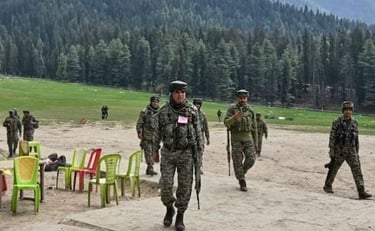Kashmir Man Arrested for Aiding Pahalgam Terrorists With Logistics, Security Agencies Tighten Crackdown
Security forces in Jammu and Kashmir have arrested a man accused of providing crucial logistical support to terrorists involved in recent activities in the Pahalgam region. This development underscores the continuing threat of militancy in the Valley while also highlighting the relentless efforts of security agencies to dismantle terrorist networks operating at local levels.


By: Bharat Daily Samachar Date: 24 Sep,2025
The Arrest That Exposed a Hidden Network
According to official reports, the man, whose identity is being withheld for security reasons, was found to have assisted terrorists by arranging safe shelters, food supplies, and information about security movements in Pahalgam. While he was not directly involved in armed attacks, his logistical role was vital in enabling the terrorists to sustain themselves and plan their activities.
Investigators believe that without such ground-level support, many terror modules would not survive for long in Kashmir’s tough terrain. His arrest is expected to provide intelligence leads that may help authorities trace larger networks operating behind the scenes.
Why Pahalgam Matters
Pahalgam, located in South Kashmir’s Anantnag district, is not only a tourist hotspot but also a strategic region. It lies close to important pilgrimage routes like the Amarnath Yatra, which has often been targeted by terrorists to create panic and disrupt peace.
By providing terrorists with a foothold in this sensitive area, local collaborators indirectly pose a grave threat not only to national security but also to tourism and the livelihood of thousands who depend on it. The arrest thus has broader implications for safeguarding peace in the region.
Local Support: The Silent Backbone of Terrorism
Security experts emphasize that terrorist groups cannot function in isolation. They often rely on local sympathizers for shelter, food, transport, and intelligence. While some individuals are motivated by ideology, others may be lured by money or coerced into helping.
This particular case highlights how logistics—something as simple as providing accommodation or a meal—can empower terrorist activities. Eliminating such support systems is as important as neutralizing militants on the ground.
Security Agencies’ Swift Action
The arrest was made after weeks of surveillance and intelligence gathering. Security agencies had been tracking suspicious movements in Pahalgam, particularly around areas less frequented by tourists. The man was picked up after clear evidence linked him to terror operatives.
Authorities believe his interrogation will reveal more details about other possible collaborators. The operation reflects the coordinated approach of Jammu and Kashmir Police, Army, and intelligence agencies in addressing both direct and indirect terrorism threats.
Government’s Message: Zero Tolerance for Terrorism
The Jammu and Kashmir administration has repeatedly stated that anyone found aiding terrorists—whether directly or indirectly—will face strict action. In recent years, local collaborators such as overground workers (OGWs) have been targeted by law enforcement to cut off the supply chain that sustains militancy.
This arrest reinforces the government’s stance that there is no “small role” when it comes to terrorism—any form of assistance to militants will be treated as a serious crime.
Impact on Local Communities
For ordinary residents, incidents like this are a double-edged sword. On one hand, they create fear and suspicion within communities. On the other hand, such arrests reassure the public that security forces are actively working to ensure safety.
Locals in Pahalgam, heavily dependent on tourism, have welcomed the arrest, expressing hope that it will deter others from collaborating with anti-national elements. The safety of pilgrims, trekkers, and tourists is critical for sustaining the local economy, which has already suffered setbacks in the past due to unrest.
The Bigger Picture: Fight Against Militancy in Kashmir
While violence in Kashmir has reduced compared to past decades, sporadic incidents continue to occur, especially in South Kashmir. Terror outfits, often backed from across the border, attempt to recruit locals or find sympathizers to keep their operations alive.
The government’s strategy now focuses not only on direct encounters with armed militants but also on choking their ecosystem—cutting off funding channels, monitoring digital communication, and cracking down on logistics support. The arrest in Pahalgam is a textbook example of this strategy in action.
What Lies Ahead
Authorities are expected to conduct further searches and question individuals who may be connected to the arrested man. Intelligence inputs suggest that Pahalgam and surrounding areas are being closely monitored to ensure no sleeper cells or safe houses remain active.
Additionally, awareness campaigns are being run in several villages, warning people against harboring or helping militants. The government aims to make locals understand that assisting terrorism not only endangers national security but also threatens the stability of their own communities.
Conclusion
The arrest of a Kashmir man for aiding Pahalgam terrorists is more than just an isolated case—it is a reminder of the intricate support systems that allow militancy to persist. By cracking down on logistical helpers, security agencies are sending a clear message: every link in the chain will be held accountable.
For the people of Kashmir, particularly in sensitive regions like Pahalgam, this move brings hope of greater safety and stability. For India, it marks another small but significant victory in the long-standing fight against terrorism.
